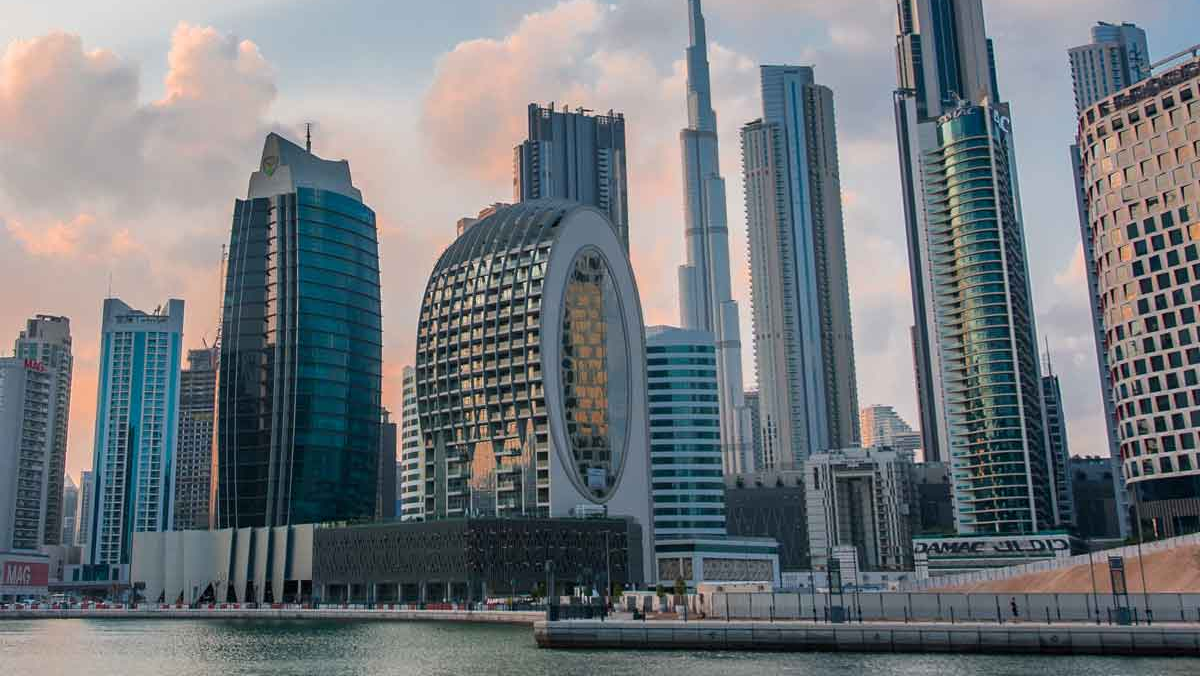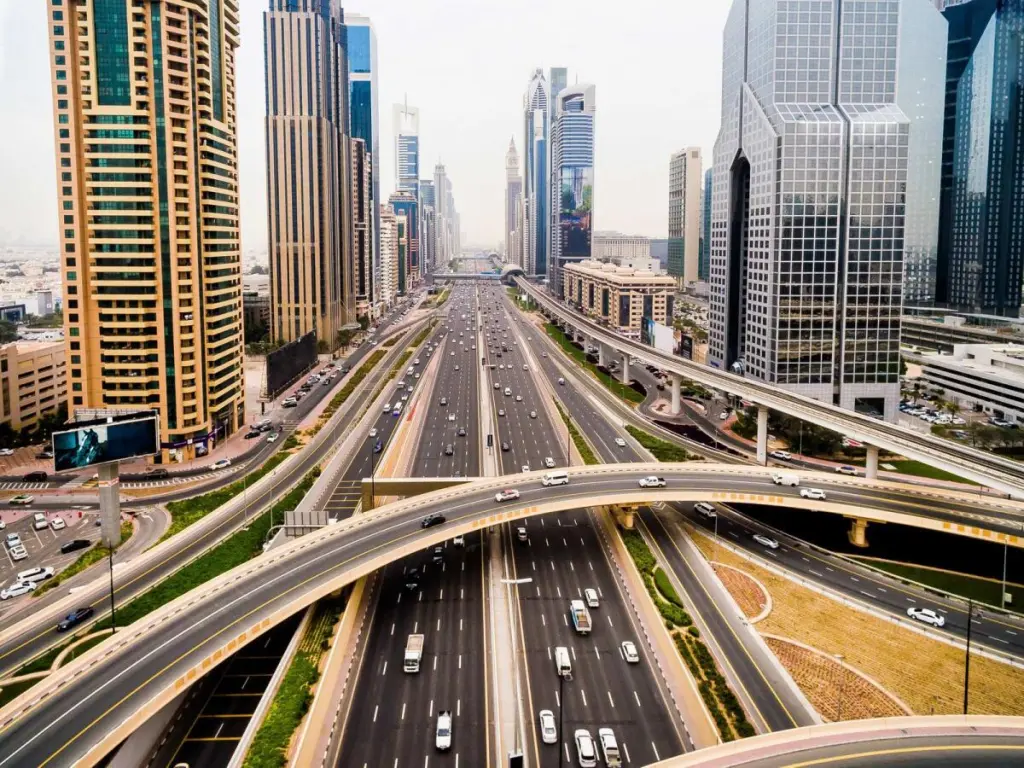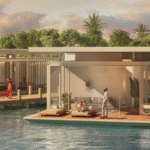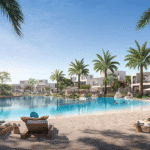Now Reading: Dubai Property: 5 Tax Considerations Before Buying in Premium Zones in 2025
-
01
Dubai Property: 5 Tax Considerations Before Buying in Premium Zones in 2025
Dubai Property: 5 Tax Considerations Before Buying in Premium Zones in 2025

Table of Contents
Dubai’s real estate market, a key driver of the UAE’s AED 2.3T property sector in 2024 (18% YoY growth, AED 458B transactions), attracts foreign investors with premium zones like Downtown Dubai, Dubai Marina, Palm Jumeirah, Emirates Hills, and Business Bay.
Freehold laws since 2002 allow 100% foreign ownership, drawing expats (80% of Dubai’s 3.5M population, mainly Indian, Pakistani, and UK investors). Properties in these zones (AED 1.2M–20M, AED 1,800–4,000 psf) offer 6–10% ROI and 6–10% appreciation by 2026.
Tax benefits include zero personal income, capital gains, and property taxes, with 2% DLD fee exemptions for off-plan purchases (saving AED 24K–400K). A 5% VAT on off-plan transactions is recoverable (AED 6K–100K). Dubai South Free Zone offers 0% corporate tax for Qualified Free Zone Persons (QFZP) with non-mainland revenue <5% or AED 5M.
Small Business Relief (SBR) exempts SMEs with revenues below AED 3M from 9% corporate tax until 2026. The Domestic Minimum Top-up Tax (DMTT) at 15%, effective January 2025, targets multinationals with revenues over €750M, sparing most investors. Below are five tax considerations for buyers in Dubai’s premium zones, focusing on cost optimization, compliance, and investment potential, supported by 2024–2025 data.
1. Maximize Off-Plan DLD Fee Exemptions
- Consideration: Opt for off-plan purchases in premium zones like Downtown Dubai (e.g., Burj Al Arab Tower, AED 3M–15M) or Dubai Marina (e.g., Emaar Beachfront, AED 2.5M–12.8M) to secure 2% DLD fee exemptions, saving AED 24K–400K per property. For example, an off-plan penthouse in Palm Jumeirah (AED 10M) saves AED 200K, enhancing affordability.
- Zone-Specific Opportunities: Downtown Dubai and Business Bay (AED 1.2M–5M, 7–9% ROI) lead in off-plan sales (60% of 2024 transactions), followed by Dubai Marina and Palm Jumeirah. Emirates Hills offers fewer off-plan options but high-value exemptions for villas (AED 5M–20M, AED 100K–400K savings).
- Compliance: Verify exemption eligibility through Dubai Land Department (DLD) portal. Ensure developer escrow compliance to protect payments. Use platforms like dxboffplan.com for off-plan listings.
- Impact: Reduces upfront costs by 2% (e.g., AED 50K on AED 2.5M, AED 200K on AED 10M), boosting net returns in high-demand zones with 90–95% occupancy and 8% rental growth in 2025.
2. Recover VAT on Off-Plan Purchases
- Consideration: Register with the UAE Federal Tax Authority (FTA) to recover 5% VAT on off-plan purchases, saving AED 6K–100K per property. For instance, a AED 3M apartment in Business Bay recovers AED 15K, while a AED 12.8M penthouse in Emaar Beachfront saves AED 64K. VAT recovery applies to construction costs for self-developed properties in Emirates Hills (AED 50K–1M).
- Zone-Specific Opportunities: High-value zones like Palm Jumeirah (AED 3M–10M) and Downtown Dubai maximize VAT savings due to scale. Business Bay and Dubai Marina offer mid-range savings (AED 6K–25K). Emirates Hills suits custom villa buyers with larger VAT recovery potential.
- Compliance: Submit VAT invoices to FTA within 30 days. Segregate exempt supplies (e.g., residential leases) to ensure eligibility. Engage advisors like Spectrum Accounts (info@spectrumaccounts.com) for VAT compliance.
- Impact: Enhances cash flow by 5% of purchase price (e.g., AED 12.5K on AED 2.5M, AED 100K on AED 20M), critical for premium zones with AED 1,800–4,000 psf prices and 6–10% ROI.
3. Leverage Personal Ownership for Tax-Free Rental Income
- Consideration: Hold properties personally rather than through a corporate entity to avoid 9% corporate tax on rental income, saving AED 2.3K–45K/year via de-enveloping. For example, a Downtown Dubai apartment (AED 65K–130K/year rent) saves AED 5.9K–11.7K annually, while a Palm Jumeirah penthouse (AED 250K–500K/year) saves AED 22.5K–45K.
- Zone-Specific Opportunities: Business Bay (7–9% ROI, AED 50K–200K/year rent) and JVC (6–8% ROI, AED 25K–180K/year) suit personal ownership due to lower rental revenues (<AED 3M). Dubai Marina and Emirates Hills (higher rents) also benefit from tax-free status.
- Compliance: Register properties via DLD portal. Use DIFC Wills Service Centre for non-Muslim inheritance planning to ensure tax-free succession. Avoid corporate structures unless managing multiple properties.
- Impact: Saves 9% on rental profits (e.g., AED 4.5K on AED 50K, AED 36K on AED 400K), maximizing returns in zones with 90–95% occupancy and 7–8% rental growth.
4. Utilize Free Zone Entities for Portfolio Investors
- Consideration: For investors managing multiple properties or leasing to international tenants, establish a Dubai South Free Zone entity to qualify as a QFZP and secure 0% corporate tax, provided non-mainland revenue is <5% or AED 5M. For instance, a Business Bay portfolio (AED 10M, AED 700K/year rent) saves AED 63K annually in corporate tax.
- Zone-Specific Opportunities: Business Bay and Downtown Dubai suit portfolio investors due to high rental yields (7–9%, AED 50K–500K/year). Palm Jumeirah and Dubai Marina attract international tenants, enhancing QFZP eligibility. Emirates Hills is less suited due to lower rental volumes.
- Compliance: Maintain separate books for mainland and free zone activities. Register with FTA for QFZP status. Engage advisors like Provident Estate (info@providentestate.com) for tax structuring.
- Impact: Saves 9% on profits above AED 375K (e.g., AED 31.5K on AED 350K, AED 90K on AED 1M), ideal for premium zones with high rental demand and 6–8% appreciation by 2026.
5. Ensure AML Compliance to Avoid Penalties
- Consideration: Comply with Anti-Money Laundering (AML) regulations by verifying source of funds through authorized banking channels (LRS limit: $250,000/year for Indian investors) to avoid penalties (AED 50K–1M). Indian buyers in Palm Jumeirah or Emirates Hills face FEMA/PMLA scrutiny for non-compliant payments (e.g., cryptocurrency), risking 120% tax penalties.
- Zone-Specific Opportunities: High-value zones like Downtown Dubai (AED 3M–15M) and Palm Jumeirah require stricter AML checks due to large transactions. Business Bay and Dubai Marina (AED 1.2M–5M) face moderate scrutiny, while JVC (AED 375K–3.5M) has lower compliance costs (AED 5K–15K).
- Compliance: Use DLD’s digital title deed system for transparency. Provide KYC documents (passport, proof of funds) via banks. Engage advisors like McCone Properties (info@mcconeproperties.com) for AML audits. Avoid unregulated payment methods to mitigate FEMA/PMLA risks.
- Impact: Avoids penalties (AED 50K–1M) and ensures smooth transactions in premium zones, supporting 90–95% absorption and visa eligibility (AED 750K+ for investor visa, AED 2M+ for Golden Visa).
Market Trends and Outlook for 2025
- Yields and Appreciation: Premium zones offer 6–10% ROI (7–11% for short-term rentals) and 6–10% appreciation, driven by AED 7.8B in Q1 2024 Dubai transactions (15% YoY growth). Rentals grew 7–8%, with 90–95% occupancy due to tourism (25M UAE visitors) and expat demand (80% of population). Average prices: AED 1,800–4,000 psf.
- Tax Environment: Zero personal income, capital gains, and property taxes. 2% DLD fee exemptions (AED 24K–400K) save AED 24K–500K. 5% VAT recoverable (AED 6K–100K). 9% corporate tax on mainland profits above AED 375K; Dubai South Free Zone offers 0% for QFZP entities. SBR exempts SMEs (revenue <AED 3M) until 2026. De-enveloping saves 9% on rental profits (AED 2.3K–45K/year). DMTT (15%) affects only large MNEs. Double tax treaties with 138 countries enhance tax efficiency.
- Infrastructure Impact: Dubai Metro Red Line extension (2029), Dubai South expansion, and Expo City developments boost values by 10–15%. Proximity to Downtown Dubai (5–15 minutes) drives rentals (AED 25K–500K/year).
- Investor Drivers: Limited supply (15,000 units by 2026), investor visas (AED 750K+), and Golden Visa (AED 2M+) fuel 80% expat demand. Sustainability (LEED, eco-friendly designs) aligns with Dubai 2040 Urban Master Plan.
- Risks: Oversupply (15,000 units by 2026) and AML compliance costs (AED 5K–15K) pose a 5–7% correction risk in H2 2025. Mitigated by 90–95% absorption, DLD escrow protections, and developer credibility (e.g., Emaar, DAMAC).
Investment Strategy
- Zone Focus: Invest in JVC (AED 375K–3.5M, 6–8% ROI) for affordability, Business Bay (AED 1.2M–5M, 7–9% ROI) for mid-range returns, and Downtown Dubai (AED 3M–15M, 7–10% ROI), Dubai Marina (AED 2.5M–12.8M, 6–9% ROI), or Palm Jumeirah (AED 3M–10M, 6–9% ROI) for luxury. Emirates Hills (AED 5M–20M, 6–8% ROI) suits ultra-high-net-worth buyers.
- Entry Points: Off-plan units with 5–10% down payments or 1% monthly plans offer DLD fee exemptions (AED 24K–400K). Early investment maximizes appreciation as infrastructure matures (e.g., Metro extension).
- Process: Verify freehold status via DLD portal. Pay 2% DLD fee (unless exempt) and 2% DLD transfer fee (AED 2K–10K). Use platforms like PropertyFinder.ae, dxboffplan.com, or Bayut.com. Required documents: passport copy, proof of funds (via authorized banking channels for FEMA/PMLA compliance), no UAE visa needed. Documents must be translated into Arabic and legalized.
Conclusion
In 2025, Dubai’s premium zones—Downtown Dubai, Dubai Marina, Palm Jumeirah, Emirates Hills, and Business Bay offer 6–10% ROI and 6–10% appreciation, driven by AED 7.8B in Q1 2024 transactions (15% growth). Tax considerations 2% DLD fee exemptions (AED 24K–400K), 5% VAT recovery (AED 6K–100K), personal ownership for tax-free rentals (saving AED 2.3K–45K/year), free zone entities for portfolios (saving AED 31.5K–90K), and AML compliance maximize returns.
Dubai South Free Zone offers 0% corporate tax for QFZP entities, and SBR exempts SMEs (revenue <AED 3M) until 2026. The DMTT (15%) affects only large MNEs. Sustainability (LEED, eco-friendly designs) aligns with Dubai 2040 Urban Master Plan. Despite a 5–7% correction risk from oversupply, 90–95% absorption and DLD escrow protections ensure stability. With prices from AED 1.2M–20M and visa incentives, these zones attract Indian, Pakistani, and UK investors. Dubai
read more: UAE Cities: 6 Tax Planning Insights for 2025 Property Developers






















